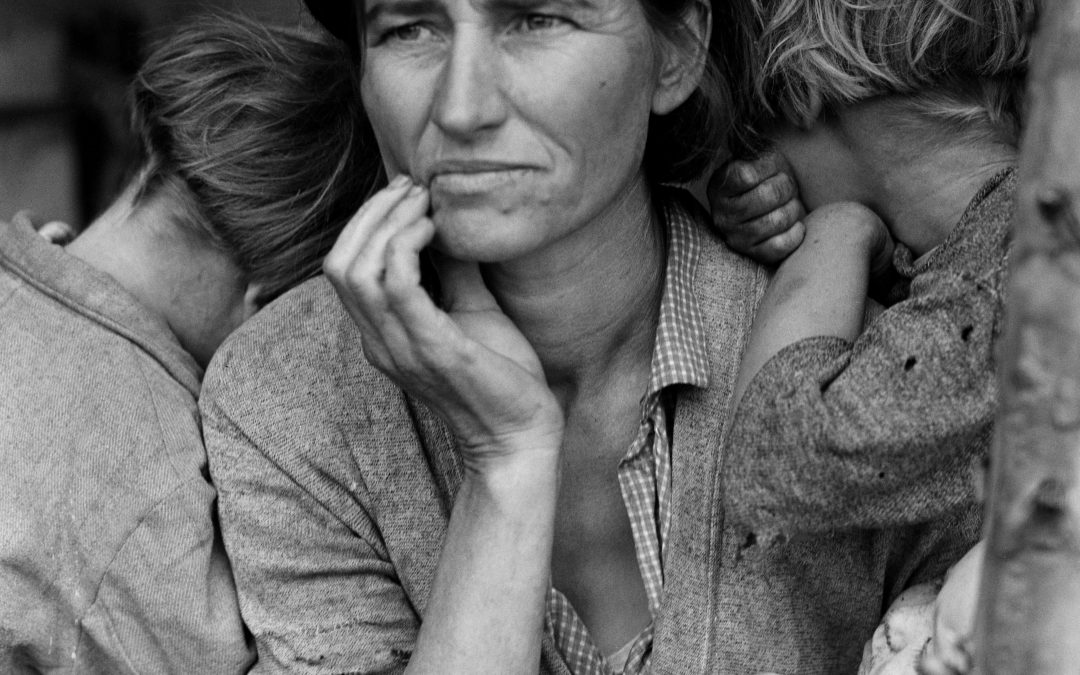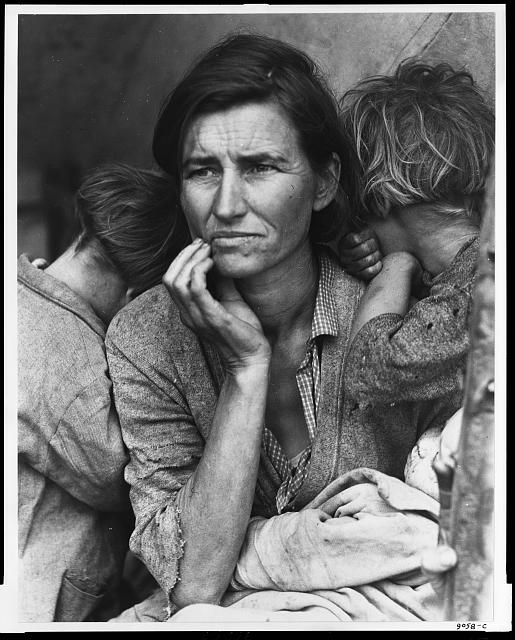This is the 5th part in my series about Finding Photographs of your Ancestor Online. (If you missed other posts, there are links at the bottom of this one.)
So what if your ancestors weren’t famous? What if they were poor, and didn’t have money for fancy studio photos? There are photographers like Dorthea Lange who spent time documenting the migrant worker families during the dust bowl era for the department of agriculture. If you know where your ancestors lived, there might be a picture of the house or farm they lived waiting for you to discover in the National Archives Digital Vaults or the Library of Congress. If you have the address from a census record, why not explore using a search engine or Google maps? I have gathered useful tidbits through this process.
After looking at early 1900’s maps of Newark, New Jersey, I realized that my great grandmother was born, christened, lived, was married, died and was buried within 3 blocks. (I am convinced that I will see her walking by on the sidewalk of a picture someday as I research that area more, and more photographs are available online.)
Questions to ask about your ancestors….
- What kind of farming did your ancestors do? If your relatives were ranchers, or ranch hands, they may have been part of a larger conglomerate or had wealthy bosses that had photographers who snapped pictures of daily life.
- Were they part of a professional or national service organization? Maybe they were CCC boys, steel workers, railroad employees or coal miners. There are tons of Free digital photo archives depending on the industry where people worked. That you can explore.
- Did your ancestor attend church? Which one? Church records and cemeteries can be valuable sources of genealogical information. The church was also an important part of socialization for many rural families. Great Uncle Bert played the fiddle for many community and church events. There are even a couple of pictures of him doing it. It may have been noted or pictured in the local newspaper. (Especially if they were talented or it was a slow news week)
- What happened where your ancestors lived? Did they survive a major catastrophe? Flood? Fire? Earthquake? Was there a railroad line that was dedicated that came through town? Was a world fair hosted near by? Was your ancestor’s hometown the birthplace of a major industry or business? Was someone famous born there? Researching local events, people and places may lead to a picture of your ancestor.
Happy Hunting!
Comment and let me know if something I suggested worked to uncover a relative’s photo. If you missed other parts of this 5 part series, I’ve included links below.
Read Part 4 Read Part 3 Read Part 2 Read Part 1


I just have to tell you that I enjoyed reading through this series just now. I plan to investigate several of the links that you have provided.
My great-grandmother, Carrie Williams Pressley, was a young woman during the 1920s. I was interested in finding information about her life during the time that women got the right to vote. I did a search and uncovered the website of a distant family member that I did not know. Their website was a treasure trove of photos for me. While it did not uncover photos of my great-grandparents, it did have photos of my great-great-grandparents (Richard and Philadelphia Pressley) and siblings of my great-grandfather (Julius Jared Pressley, husband to this particular great-grandmother). I sat here staring at the computer screen, crying my eyes out as their faces looked back at me from those old photographs. I know that I don’t have to explain that feeling to you. 🙂
I did not find what I was originally looking for. I found a whole lot more!
I hope that all of us that seek to find these old photographs will be successful. Have a blessed day!
I would like to find more Photos of my Reed family they are hard to find and and from what i have found few to none. ILLINOIS. kansas, and Mo.
Kansas and MO have huge digital archives. I would recommend searching by occupation, and local archives. Depending upon where they they lived, religious affiliations and the time period, there may be additional resources. For example, Polish populations in Chicago
I have a photo, supposedly of my great grandmother, taken probably in Shanghai China in the early 1930’s soon before she died.
Just an ID portrait with no identification. (She was a refugee from Russia)
Do you know of a site where I can post such a photo in the hope that somebody may recognize it?
Thanks,
Richard.
What a wonderful treasure Richard! I would recommend adding it to memories on FamilySearch. FamilySearch is free, and you can build a tree and attach it to her profile. You can upload as many pictures as you want to for free as well. When you upload them, there’s an option to add information about when and where the picture was taken. You can also name it in a way that people may search for it. For example “Betty Sue’s Russian refugee picture about 1930” The more information you tag it with, the more likely it will be to come up in a search if someone is looking for it.